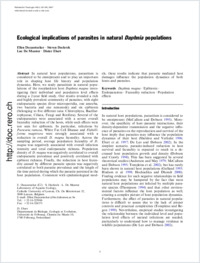Ecological implications of parasites in natural Daphnia populations
Université de Fribourg
- Decaestecker, Ellen Laboratory of Aquatic Ecology, Catholic University of Leuven, Belgium
- Declerck, Steven Laboratory of Aquatic Ecology, Catholic University of Leuven, Belgium
- De Meester, Luc Laboratory of Aquatic Ecology, Catholic University of Leuven, Belgium
- Ebert, Dieter Ecology and Evolution, Department of Biology, University of Fribourg, Switzerland
-
14.04.2005
Published in:
- Oecologia. - 2005, vol. 144, no. 3, p. 382-390
English
In natural host populations, parasitism is considered to be omnipresent and to play an important role in shaping host life history and population dynamics. Here, we study parasitism in natural populations of the zooplankton host Daphnia magna investigating their individual and population level effects during a 2-year field study. Our results revealed a rich and highly prevalent community of parasites, with eight endoparasite species (four microsporidia, one amoeba, two bacteria and one nematode) and six epibionts (belonging to five different taxa: Chlorophyta, Bacillariophyceae, Ciliata, Fungi and Rotifera). Several of the endoparasites were associated with a severe overall fecundity reduction of the hosts, while such effects were not seen for epibionts. In particular, infections by Pasteuria ramosa, White Fat Cell Disease and Flabelliforma magnivora were strongly associated with a reduction in overall D. magna fecundity. Across the sampling period, average population fecundity of D. magna was negatively associated with overall infection intensity and total endoparasite richness. Population density of D. magna was negatively correlated to overall endoparasite prevalence and positively correlated with epibiont richness. Finally, the reduction in host fecundity caused by different parasite species was negatively correlated to both parasite prevalence and the length of the time period during which the parasite persisted in the host population. Consistent with epidemiological models, these results indicate that parasite mediated host damages influence the population dynamics of both hosts and parasites.
- Faculty
- Faculté des sciences et de médecine
- Department
- Département de Biologie
- Language
-
- English
- Classification
- Biological sciences
- License
-
License undefined
- Identifiers
-
- RERO DOC 5442
- DOI 10.1007/s00442-005-0083-7
- Persistent URL
- https://folia.unifr.ch/global/documents/299890
Statistics
Document views: 171
File downloads:
- Texte intégral: 314
